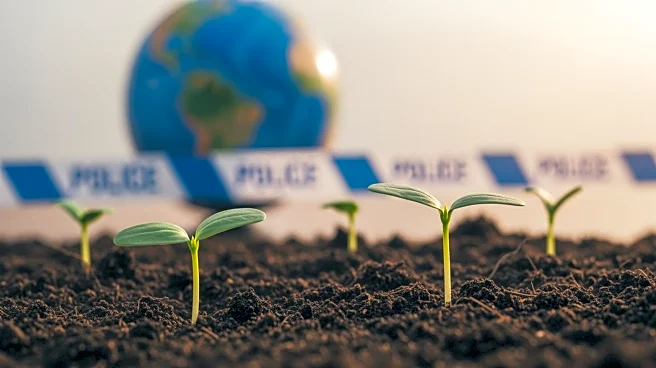What's Happening?
During the COP30 climate summit, donors committed over $142 million to CGIAR to enhance agricultural research and innovation aimed at developing climate-resilient food systems. The funding, contributed
by countries including the United Kingdom, Denmark, Belgium, and Canada, is intended to transform research into practical tools and programs that assist countries in setting adaptation targets and measuring progress. CGIAR, operating in over 80 countries, has been instrumental in developing drought-tolerant seeds and climate-smart agronomy, benefiting millions of farmers. The pledges aim to scale partner-led research to reduce emissions from agriculture while strengthening resilience in regions where yields and incomes are most vulnerable.
Why It's Important?
The pledges at COP30 are significant as they address the adaptation finance gap in agriculture, which receives a disproportionately small share of climate finance. Agriculture is responsible for producing one-third of the world's food, yet it attracts only about $10 billion in climate finance, highlighting a vast gap between need and resources. The funding aims to make adaptation projects investible by backing evidence generation, monitoring systems, and country-level technical support. This is crucial for regions like the Sahel and coastal West Africa, where investments in drought-tolerant seeds and salt-tolerant rice require long-term finance to ensure food security and shoreline protection.
What's Next?
The next steps involve deploying the pledged funds to scale proven innovations, paired with blended finance to attract commercial partners. This approach is expected to catalyze wider financial flows and ensure that the science financed at COP30 becomes the foundation for transactions that governments, local banks, and investors can commit to for the long term. The goal is to transform research into seed systems, market contracts, and livelihoods that are less exposed to climate-related challenges such as droughts and pest outbreaks.
Beyond the Headlines
The pledges at COP30 highlight the need for predictable multi-year financing and streamlined access modalities to enable ministries of agriculture and rural development to produce bankable project pipelines. The integration of CGIAR's evidence with clear procurement frameworks and capacity building in national research institutes is essential for accelerating project implementation. Without these elements, even generous pledges risk becoming short-term programs that do not achieve structural resilience.










